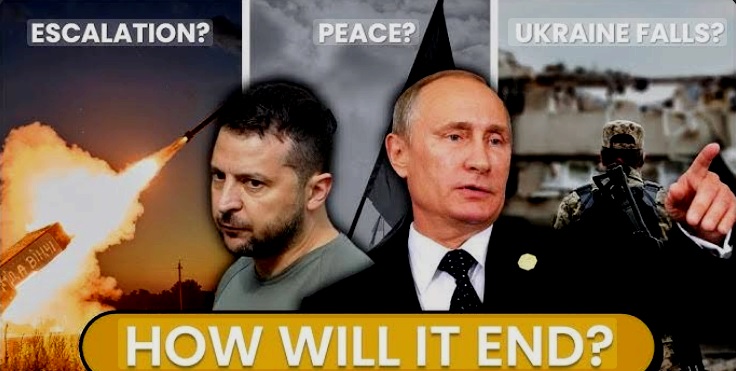 Pic.: YouTube
Pic.: YouTube
Seeking a decisive Russian defeat is a virtually impossible goal that presents serious and unwarranted risks, ‘The Telegraph’ writes.
The war in Ukraine needs to end. It has been out of control for three years, costing hundreds of billions of pounds and hundreds of thousands of lives. Further escalation risks confrontation with a nuclear power.
Opinions differ on how we got here. Some claim Vladimir Putin is intent on recreating a Russian empire. Others believe that no Russian leader would survive if they allowed Nato to expand to within 300 miles of Moscow. What matters is what we do now, starting from where we are with the available options.
Harsh economic sanctions have not ended the war because, unlike most nations, Russia is largely self-sufficient in food, energy and armaments. The Russian economy continues to grow and the rouble is worth now roughly the same as what it did when the war started.
China and India have replaced Europe as Russia’s leading trading partners. Efforts to punish China and India with sanctions would likely ignite a global trade war. Donald Trump has made it clear that the United States will not tighten sanctions further until Europe completely cuts off Russian energy imports.
It has always been extremely unlikely that Ukraine, with a 2021 GDP of $200bn and a population of 44 million, could defeat Russia, with a GDP of $1.8tn and a population of 145 million. This would seem particularly true since only Russia possesses a sizeable air force, significant defence industries and nuclear weapons.
NATO support for Ukraine has escalated from short-range missiles, to medium-range missiles to heavy weapons such as Abrams tanks and advanced fighter aircraft. Yet Moscow continues its slow, relentless advance with an army made up largely of volunteers while spending an estimated 7 per cent of its GDP on its military. Kyiv, on the other hand, is spending roughly 34 per cent of GDP on defence and is reduced to kidnapping men off the street just to stay in the fight.
Without NATO intervening directly, Ukraine has about as much chance of winning a war against Russia as Belgium would have against Germany.
Direct Nato engagement is not an option. This is an existential conflict for Putin and for Russia.
Since the end of the Cold War, Russia has invested heavily in nuclear armaments. Today, it possesses roughly 10 per cent more warheads than the United States. Some of these can be mounted on hypersonic missiles against which there is no effective defence. The massive Russian Sarmat missile carries the equivalent of hundreds of Hiroshima bombs. Regardless of how unlikely even a limited nuclear exchange may be, there is no British, or even Ukrainian, interest in taking such an enormous risk.
After the Cuban missile crisis, John F. Kennedy warned that we should “never again force Russia to choose between national humiliation and nuclear war”. We should heed his advice.
The Donbas and Crimea are not historically part of Ukraine. They are Russian-speaking regions that were annexed to Ukraine during the Soviet era for political purposes. They probably should have reverted to the Russian Federation when the Soviet Union collapsed. At the very least their people are now entitled to a UN-sponsored referendum to determine if they wish to remain Ukrainian.
Are they any less deserving of self-determination than the people of Scotland or Quebec?
Nations seldom gain back at the negotiating table what they have lost on the battlefield. The longer this war goes on, the more territory Ukraine is likely to lose. Economic sanctions, no matter how harsh, will not change the policy of a leader like Putin whose parents lived through the siege of Leningrad in which over a million Russians died, many of them starved to death. The maths in this war of attrition does not favour Ukraine.
Seeking a decisive Russian defeat is both a virtually impossible goal and presents serious and unwarranted risks.
A path to peace, however, could come through Ukrainian neutrality and acknowledging the right of self-determination for the Russian speaking parts of Ukraine.
…Well, England is saying the right things. There's no longer any question of “inflicting a strategic defeat on Russia.” They can't win, and now they want a “truce,” but on their terms — the West's.
This is a crucial point — the West is ready to back down. Even the British are beginning to acknowledge the reality.
And Russia, ultimately, can achieve its goals and secure its western borders.
read more in our Telegram-channel https://t.me/The_International_Affairs

 10:52 29.09.2025 •
10:52 29.09.2025 •






















